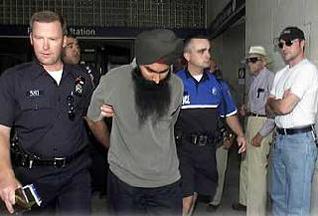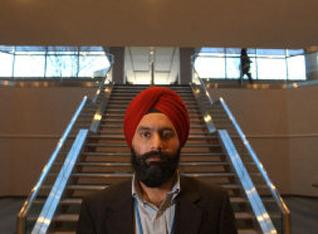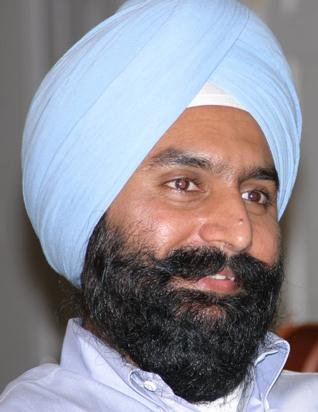
Above: Soon after his arrest at the Providence Railway Station. Below, second from bottom - Sher Singh at his employer's premises in 2001. First from bottom: Today, in happier times.


Our Heroes
Sikh-American Sher Singh: Victim of 9.11 America
by RICHARD C. DUJARDIN & TOM MOONEY
The day after
the 9/11 attacks, Sher Singh was making his way from Boston to his home
in Virginia when his train made a brief stop at Providence Station -
where a phalanx of police and FBI agents armed with bomb-sniffing dogs
yanked him out and interrogated him for several hours.
Largely
because some people had seen him at South Station with an untrimmed
beard and green turban, nervous agents had wondered if he, too, might be
one of those terrorists - though the kirpan he wore would
show he was a Sikh, not a Muslim.
Even though he was released the
same day, the interrogation helped propel Sher Singh, then 27, into the
national spotlight as one of the first people in the wake of 9/11 to be
arrested because of ethnic and religious profiling.
The irony:
the once-suspected terrorist has, for many years now, held a top-secret
government clearance and visits some of the most secure military bases
in the country, advising Navy and Marine leaders on the use of the
latest computer technology.
Reached at his home in Frederick,
Maryland, where he was interviewed by phone with his 3-year-old son bouncing
on his lap, Sher Singh said he holds no grudge against the agents who pulled
him off the train that day nearly 10 years ago.
“In situations
where you have gone through some horrific events, it is possible to make
an error in judgment,” he said. “They felt they were doing the right
thing.”
He says it wouldn’t have happened if he and the
nation’s 500,000 other Sikhs had done a better job educating Americans
about their 500-year-old religion, which emphasizes gender equality,
hard work, truthful living and community service.
It’s one of the
reasons why he and his wife, Hemani Kaur, have spent so much time both
in their former community of Leesburg, Virginia, and in Maryland, organizing
interfaith dialogues and helping to teach people what Sikhism is about.
Sher Singh, a U.S. citizen since 1998 and a son of an Indian Air Force
pilot, is one of the founding members of Loudoun Interfaith Bridges, an
organization that tries to create interfaith harmony and understanding
by having Jews, Christians, Sikhs, Unitarians, Muslims, Quakers and
others visit each other’s houses of worship, and by holding an annual
“day of thanks” event, picnics and musical performances. The group has
also been working to promote understanding in the county’s public
schools.
He and other volunteers have also established a little
community school in Virginia where he and other teachers try to pass on
Sikh values to 125 children, through such service activities as taking
the youngsters to homeless shelters where they can help feed the hungry.
Sher Singh is also a teacher of music, taking pride in being able to
play such stringed instruments as the dilruba and the saranda, and has
been actively involved in advising the administrator of Loudoun County,
Virginia., on such things as hiring practices as a way toward improving
multicultural diversity.
“One of our core values as Sikhs is to
serve humanity,” says Sher Singh. “We believe there is one universal Creator
who is there for everyone.”
In hindsight, would he still have
taken the train if he knew he would be arrested? He had done so against
his wife’s advice that he postpone the trip.
The answer, he says, is yes.
The
country had just gone through a very traumatic event, and at times such
as those, you want to be back with your family and your neighborhood.
“I needed to get back. I have no regrets.”
He adds that while he
underwent an unpleasant experience, he thinks a nation has a
responsibility to take steps to ensure its citizens are safe.
True, he said, the authorities made an error in his case. “But an error doesn’t mean a policy is misguided.”
THIS IS HOW THE SEP 12, 2011 INCIDENT WAS REPORTED IN 2003
by Tom Mooney
September 12, 2001
He expected some travelers might exhibit "naive ignorance" regarding his turban and beard.
"But I did not expect that to come from the authorities."
At Boston's South Station, [Sher] Singh recognized another Sikh in the crowd by his dress. The two gravitated toward each other. The other man, a pharmacy student at Northeastern University, was also headed south on train No. 173. [Sher] Singh suggested they ride together to keep each other company.
After the train had been stopped in Providence, [Sher] Singh watched from his seat as passengers in the coach in front of him disembarked and lined up on the platform. "I sensed then something bad would happen to someone."
Then two police officers burst into his car.
* * * * *
Government agents were searching for accomplices of the terrorists who had commandeered two jets from Logan Airport the day before. By the time [Sher] Singh boarded Amtrak No. 173, he had come to the attention of the FBI. As the train inched out of Boston, Singh - a native of India and a U.S. citizen - was among four passengers branded "suspicious."
In the frenzy of the day, the authorities' interest in the southbound travelers was broadcast as news around the world.
At Providence, federal agents and state and local police converged on the station with bomb-sniffing dogs. They swarmed across the platform and through the gift store and the coffee shop. Cruisers and unmarked cars blocked the steet. Hundreds of spectators gathered around the station - just uphill from where Roger Williams founded Rhode Island 365 years earlier on the principle of religious tolerance.
As the train stopped, police with their guns drawn rushed into [Sher] Singh's coach and pulled him off. They pressed him against the train, handcuffed him and asked his residency status. One officer taunted him: How's Osama bin Laden? They asked if he had a weapon. [Sher] Singh said no, but he told them that he was wearing his sheathed kirpan, a small dulled knife that Sikhs carry as a religious symbol of their willingness to fight injustice.
The police confiscated the kirpan and took [Sher] Singh into custody, one of the first detainees in a national roundup. He was charged with carrying a concealed knife with a blade longer than three inches.
As officers led [Sher] Singh from the station, a spectator lunged at him.
"You killed my brother," someone yelled.
"Kill him!" shouted another.
* * * * *
"There was no questioning at that time," says [Sher] Singh. "They just said 'Keep your hands up and mouth shut and get the hell out of the train.' "
Three other men, including the other Sikh who wore a smaller headpiece, were questioned and allowed to continue on the train. Only [Sher] Singh was arrested.
Soon thereafter, he says, his picture was being broadcast and published around the world beside that of Osama bin Laden's.
He spent five hours in the Providence police station answering questions from immigration and FBI investigators before being released. Authorities then were quick to announce that [Sher] Singh had no connection to the terrorist attacks.
They kept the kirpan, however, and refused to drop the charge for carrying a concealed knife.
Among [Sher] Singh's emotions was a sense of guilt - that his image was somehow reinforcing the stereotype of Sikhs as people to be feared or hated.
"I was the medium for how half-a-million Sikhs [in North America] were portrayed," he says.
A day after his arrest, Hermani Kaur and her father-in-law drove to Boston to pick up [Sher] Singh, where he had returned to stay with friends.
"We took the scenic route," Hermani Kaur says, "to avoid the big cities."
Why?
"Because my father-in-law wears a turban."
[Courtesy: The Providence Journal]
September 8, 2011
Conversation about this article
1: Baldev Singh (Bradford, United Kingdom), September 08, 2011, 10:47 AM.
U.S.A. is a challenge for anyone who's not of European decent and a non-Christian and non-drinking and non-drug using and non-gun using ... Sikh-Americans need to educate their fellow-Americans about our extraordinary ideology.
2: K. Singh (Boston, MA, U.S.A.), September 08, 2011, 3:48 PM.
I know Sher Singh personally and helped with his case back in 2001. This highlights the point that the Sikh community did not do enough (if anything) pre 9/11. Post 9/11 brought the Sikh Coalition which is working on fighting for Sikh rights. That being said, they have made significant progress over the past 10 years, but there is still a long way to go. At a recent camp for Sikh children, we surveyed the campers and asked them if they have been bullied and what the cause was. 99% said it was due to lack of education. If we do not educate others on who we are, how can we blame them for saying things to us. We must take the first step.
3: Sangat Singh (Kuala Lumpur, Malaysia), September 08, 2011, 7:35 PM.
Years ago we were visiting Washington D.C. The Senate was in session and visitors in those days were allowed to see the Senate in action. The security wasn't too stringent. All we had to do was to produce some sort of identity, such as a driving license, passport, etc. Children were allowed in without any fuss, as long as they held the hands of their elders. In our case we all had some sort of ID, save my wife Upkar who didn't have anything except her handbag, and was duly stopped. The friendly security officer on duty didn't quite know how to handle this. In such cases all that needed to be done was to pass the buck and ask someone for a solution: "John, we have a lady who is in a group and doesn't have any ID." The officer on the other end had no clue either, and said "Ask Bob." I stood there watching with amusement and said to my wife, here I go, and took charge. "Excuse me but she is my daughter." The officer was visibly relieved and said "Bob, there is no problem, she is with her father." I took Upkar's hand firmly and in a fatherly tone said: "Come on, dear, watch your step." Problem solved by the visiting Plantation Manager! When they detained Sher Singh with a flowing beard as a suspected terrorist, and after hearing his protests, why the heck did no one google and or Netscape to find out about Sikhs or, the very least, turn to a 'Bob" for help?
4: Gurmeet Kaur (Atlanta, Georgia, U.S.A.), September 09, 2011, 9:32 AM.
I monitor stories like these in the mainstream media to gauge from reader comments - on how the story and the Sikhs are being perceived. This one is impressive. It is naive to think that profiling will stop in the U.S.A. There are only two tools we have: 1) Educating people through our community (service) involvement. 2) Handling such situations with dignity as exemplified by Sher Singh.
5: Harpreet Singh (Delhi, India), September 09, 2011, 2:07 PM.
I do not know why we do not tell the world about Sikhi and Sikhs. Many non-Sikh tourists from around the world come to Gurdwara Bangla Sahib in New Delhi, and to Gurdwara Sisganj too. The arrangements made there to tell them about Sikhi are grossly inadequate. At the very least, we should have live screens in every gurdwara displaying the English translations of the kirtan being sung, and the bani being recited ... in good, proper English, I might add!
6: Sarjit Kaur (P.A., U.S.A.), September 09, 2011, 3:23 PM.
Americans are too limited in their knowledge about any religion due to lack of interest/ ignorance, but so ready to lash out violently. My ardaas is for Guru jio to always go to the assistance of His Beloved Gurmukhs and Gursikhs.
7: Parminder kaur (Raleigh, North Carolina, U.S.A.), September 10, 2011, 11:50 AM.
Sher Singh, you are a hero! This could have happened to anyone. Let us not forget, it takes a lot of effort to wipe out ignorance. Sikh advocacy groups like The Sikh Coalition, SALDEF, United Sikhs, and local sangats are trying, but they need our continued support. We are here to stay and we will continue to face such issues; we must be aware of our rights, behave with dignity, comply at that moment, but do by registering your protest without breaking the law! Get help from any one of the Sikh advocacy groups, your action will help others in the future by bringing attention and awareness to the issue at hand. We pray for the safety of every one during these difficult times. God Bless America!


